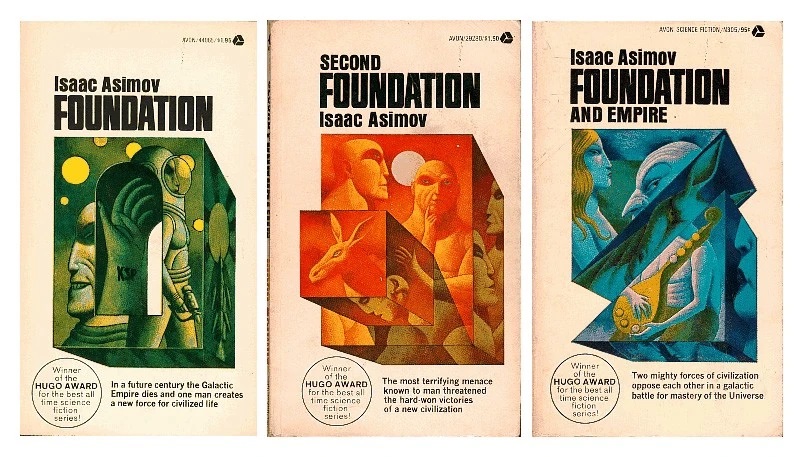
The TV series Foundation inspired me to delve into the work of Isaac Asimov (1920-1992). He is considered one of the greatest science fiction writers and is also famously the inventor of the “laws of robotics”. A recurring theme in his work is the relationship between determinism and freedom, which is of particular interest to Marxists.
In the Foundation saga, he introduces us to a fascinating universe set several millennia after the present day. A scientist (Hari Seldon) discovers a new science, “psycho-history”, which enables him to predict the collapse of the galactic empire, and with it, a return to barbarism. With the aim of rebuilding human civilization after its collapse, Dr. Seldon establishes an organization of scientists (the Foundation), which aims to compile all of mankind’s historical knowledge into an Encyclopedia Galactica.
Using mathematical models based on physics and psychology, psycho-history is able to establish the probabilities of different futures. Its predictions pertain to social movements and trends—not those of individuals—such as wars, rebellions and social crises. According to Asimov, by learning about the determinisms at work in history, humans would acquire the ability to alter the course of events.
Asimov expresses powerful ideas here: human freedom does not exist in the absolute, but is conditioned by a host of determinisms. In return, humans can influence and emancipate themselves from these determinisms by becoming aware of how they affect them. Capitalist society, for example, conditions us to think and act in certain ways, but we can study how it works and choose to fight for its overthrow.
The great philosopher Hegel rightly said that freedom lies in the recognition of necessity. Marx, for his part, explained that it is human beings who make their own history, albeit under conditions not of their own choosing but rather inherited from the past. There is no such thing as absolute freedom or absolute determinism. Both coexist and condition each other. This great philosophical truth, at the heart of Marxism, finds a particularly interesting expression in Asimov.
Asimov was no Marxist. He did, however, grow up in a progressive Russian milieu in Brooklyn during the rise of Stalinism and was probably familiar with the theoretical foundations of Marxism. He was an atheist and taught biochemistry, which is reflected in his work, where materialist philosophy is omnipresent.
But can we really predict human history? Asimov adds a number of caveats, linked to the existence of individual freedom. But the fact remains that he presents psycho-history as a science capable of predicting social events with high probability. This is, of course, fiction. Marxism makes no such claim. It doesn’t make predictions; it establishes perspectives based on analyses of the processes at work.
Secondly, psycho-history cannot predict the behavior of individuals but only that of large groups of individuals. The writer takes up themes from physics such as Brownian motion: we can’t predict the movement of an individual particle in a fluid, but we can make very precise predictions by studying large quantities of interacting particles, whereby a certain order emerges from the chaos. This is what we call an emergent phenomenon.
The main problem with psycho-history—while bearing in mind that it is a purely fictional theory we are talking about—is that it claims to be able to reduce the complexity of human history to mathematical, physico-chemical and psychological interactions. This old mechanistic conception of the world falls into the trap of reductionism. By contrast, the dialectical method at the heart of Marxism understands that human society is an emergent phenomenon of nature, with its own laws that are irreducible to those governing particles.
To really establish perspectives on history, we need the right method of analysis, that of Marxism. Marx brilliantly summed up its essence: “The mode of production of material life conditions the process of social, political and intellectual life in general. It is not the consciousness of men that determines their being; it is conversely their social being that determines their consciousness.”
Unlike the collapse of the galactic empire in Foundation, the collapse of the capitalist system is not inevitable, but it depends on us. We must organize ourselves to overthrow it before it drags humanity into even greater barbarism. And when we need some well-earned rest, there’s always Asimov.

